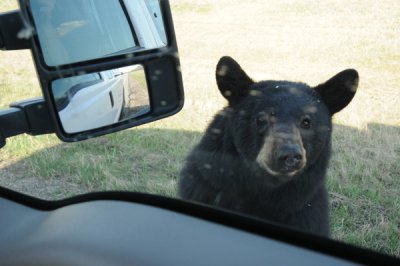ramonmercado
CyberPunk
- Joined
- Aug 19, 2003
- Messages
- 58,830
- Location
- Eblana
Trouble bruin? Will we have a Planet of the Bears? This could polarise debate.
Black bears show counting skills on computers
http://www.bbc.co.uk/nature/18447587
By Matt Bardo
Reporter, BBC Nature
Deep in thought? Bears can "do something analogous to counting", researchers say
Related Stories
Bear hitches ride on rubbish truck Watch
Bear strays into US neighbourhood Watch
Bears' wounds heal as they sleep
Black bears have demonstrated counting abilities, in a first for the species.
Three captive bears took a series of number-based tests on a touch-screen computer, research published in the journal Animal Behaviour showed.
They had to choose between two different-sized sets of dots and were rewarded with food for correct answers.
"People don't generally understand them to be as intelligent as they probably are," said Jennifer Vonk, the researcher who led the study.
Although bears have the largest relative brain size of any carnivore, their cognition is not well understood.
Continue reading the main story
Bear in mind
Black bears have a large brain size in comparison to their bodies. They have been filmed doing some remarkable things:
Bears versus bees: See the stings a black bear endures for the taste of honey
Going it alone: Meet an abandoned bear cub, surviving on her own in the wilderness
Climbing daredevils: Look at how high up in the forest black bear cubs can climb
Bear bite: Find out how a BBC cameraman got a warning bite from an adult bear
Takeaway fish: Watch a white black bear go fishing for the first time
Or look on BBC Nature Wildlife Finder
Dr Vonk, an assistant professor in psychology at Oakland University said that the North American black bears were first trained to understand the process and equipment involved in the tests.
"This is the first published work with bears working on a touch screen," she said. "It hasn't been done with any large carnivores."
The experiment then involved presenting the bears with two sets of dots or "arrays".
"Basically we were looking to see if they can understand to choose less or choose more," she said.
They touched the screen to select one or other of the arrays, and were given food if they got the answer right.
One bear was rewarded for touching the screen with a greater number dots, and for the other two bears, a correct answer was an array with a fewer number of dots.
The team wanted to ensure that the animals were not merely estimating magnitude, a skill that has been shown by many animals.
"We're really trying to differentiate between the ability to perceptually discriminate amount from actually quantifying a number of items," explained Dr Vonk.
So the team varied the pattern of the dots and the shaded area on which the arrays were shown, and in some tests the dots were also moving.
North American black bears benefit from being able to turn their hand to wide range of tasks
"If there's more dots and less area covered - it's a better indication that they actually do something analogous to counting rather than just estimating the amount of something," Dr Vonk said.
Although the study found that bears did better when the size of the area corresponded to the number of dots, they also found that the bears were capable of compensating for an area that was smaller or larger than normal for the number of dots it contained.
"What was important is that we showed that they could work against that in some of the tests," Dr Vonk said.
Black bears in the wild are often solitary, non-social animals, so the results suggested that animals that do not live in a group may have the ability to make number-based judgements.
"This is really the first test of a species that has not evolved to live socially to see if they can individuate items," she said.
"I think we can't really say that they're absolutely counting at this point but it does look like they're attending to the number of items and not just the area."
Similar tests on primate species allowed the scientists to compare the ability of the black bears with non-human primates.
For at least one of the bears, they found a pattern that matched.
These results are among the first to show that bears may have cognitive abilities that are equal to primates.
"I've been working for a while with these bears... but simultaneously I was working with a chimpanzee," said Dr Vonk.
"I find that their abilities so far in terms of categorisation and forming more abstract concepts seem quite comparable."
The techniques used to research the bears' skills could be used in the future to look at bear cognition in more depth.
"It really opens up the door to asking all kinds of comparative and cognitive questions with a species that really hasn't been investigated in that way before," she said.



